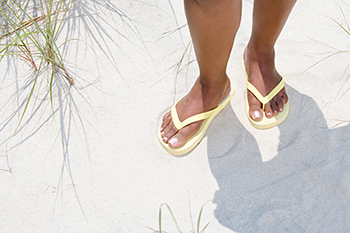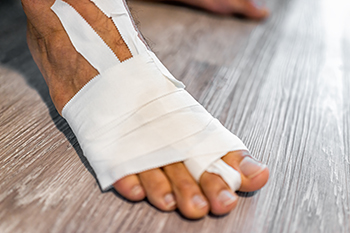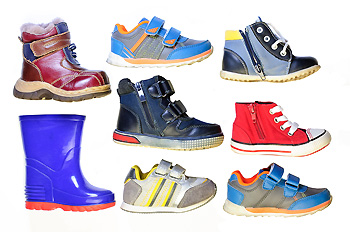Items filtered by date: November 2022
Is Wearing Flip-Flops Better Than Walking Barefoot?

Walking barefoot can be better than walking in ill-fitting shoes, high heels, or flimsy flip-flops but there are a host of dangers that walking barefoot can bring on, from stepping on glass to acquiring an infection. Flip-flops should not replace sturdier casual footwear even if they look fashionable. Wearing flip-flops for a prolonged time can cause pain. Researchers have discovered that wearing flip-flops alters the way one walks, and an altered gait can lead to serious sole, heel, and ankle problems. This footwear also lacks foot support. One scrunches their toes to keep them on their feet while the heel is lifted into the air. This motion stretches the plantar fascia, the band of connective tissue that runs from the heel to the toes on the bottom of the foot, and can cause inflammation to the heel and sole, as well as heel spurs and tired feet. Flip-flop wearers shorten their stride and turn their ankles inward, probably to keep the flip-flops from falling off, which can cause ankle problems. If you have questions about wearing flip-flops, contact a podiatrist, an expert in everything related to the feet and ankles.
Flip-flops are not always the best choice of footwear. If you have any concerns about your feet or ankles, contact Kenneth Donovan, DPM from Advanced Care Foot and Ankle. Our doctor will assist you with all of your foot and ankle needs.
Flip-Flops and Feet
When the weather starts warming up, people enjoy wearing flip-flops. Flip-flops are comfortable, stylish, and easy to slip on and off; they're perfect for any summer beach goer. However, these shoes can cause harm to the feet.
How Can Flip-Flops Affect Me Long-Term?
- Ankle problems
- Hip problems
- Lower back problems
- Pain in the balls of the feet
- Problems with foot arches
- Changes in the way you walk
Are There Injuries Associated with Flip-Flops?
Yes. Since flip-flops are relatively weak and do not provide the same amount of support as sneakers, people who wear flip-flops regularly are more susceptible to injuries. On top of that, the open nature of the shoe makes your feet more prone to other problems, such as cuts and even infections. Common injuries and ailments include:
- Sprained ankles
- Blisters
- Infections
- Cuts and Scrapes
I like Wearing Flip-Flops. Are There Safe Alternatives?
When buying flip-flops, try to find ones that have sturdy soles and that are made of high-quality materials that will support for your feet. These flip-flops will cost more but will also last longer as a result.
If you have any questions please feel free to contact our office located in Charleston, SC . We offer the newest diagnostic and treatment technologies for all your foot and ankle needs.
What Is Turf Toe?

Turf toe is an injury to the joint at the base of the big toe that often occurs in athletes who play field sports, like football, baseball, and soccer. It happens when an athlete forcefully jams his or her toe into the ground and it bends backward, beyond its normal limit. This can easily happen when a sport is played on grass or artificial turf, hence the name turf toe. Some experts believe this injury can also result from sports shoes that do not have a stiff toe, are not rigid enough in the forefoot, or from not wearing the correct cleats on their shoes for their chosen sport. This type of injury usually results in a bruise at the base of the big toe, where the joint capsules and ligaments have stretched or torn. This affliction causes extreme and immediate pain and over time the joint may become stiff and be more prone to arthritis. The lack of mobility in this joint can increase the chance of injuring the big toe again in the future. It must heal completely or will impede continuation in sports. If you or your child has hurt their big toe in this way, it is suggested that you visit a podiatrist who can make a proper diagnosis and offer treatment.
Sports related foot and ankle injuries require proper treatment before players can go back to their regular routines. For more information, contact Kenneth Donovan, DPM of Advanced Care Foot and Ankle. Our doctor can provide the care you need to keep you pain-free and on your feet.
Sports Related Foot and Ankle Injuries
Foot and ankle injuries are a common occurrence when it comes to athletes of any sport. While many athletes dismiss the initial aches and pains, the truth is that ignoring potential foot and ankle injuries can lead to serious problems. As athletes continue to place pressure and strain the area further, a mild injury can turn into something as serious as a rupture and may lead to a permanent disability. There are many factors that contribute to sports related foot and ankle injuries, which include failure to warm up properly, not providing support or wearing bad footwear. Common injuries and conditions athletes face, including:
- Plantar Fasciitis
- Plantar Fasciosis
- Achilles Tendinitis
- Achilles Tendon Rupture
- Ankle Sprains
Sports related injuries are commonly treated using the RICE method. This includes rest, applying ice to the injured area, compression and elevating the ankle. More serious sprains and injuries may require surgery, which could include arthroscopic and reconstructive surgery. Rehabilitation and therapy may also be required in order to get any recovering athlete to become fully functional again. Any unusual aches and pains an athlete sustains must be evaluated by a licensed, reputable medical professional.
If you have any questions please feel free to contact our office located in Charleston, SC . We offer the newest diagnostic and treatment technologies for all your foot and ankle needs.
How to Keep Babies Shoes on Their Feet

Many parents look forward to purchasing their baby's first pair of shoes. Prior to this enjoyable time, many parents have their babies crawl and walk barefoot, which is helpful in strengthening the entire foot. When it is time for your child to walk outside, they may like the sensation of feeling different surfaces on their feet, such as grass and sand. For rougher surfaces or inclement weather, shoes will need to be worn. Research has shown it is best for the first shoes to have non-slip soles and to be made with flexible materials. The fit should be perfect when the shoes are first tried on, and a break-in period is not needed. Many babies like to pull their shoes off, and there are various ways to avoid that. Firstly, it is important to make sure they fit correctly and are not too tight. Secondly, they may try to pull them off because they don’t like them, and parents need to make sure as best as they can that this is avoided. This may have to be done by testing various styles and colors before purchasing the shoes. If you have questions about what type of shoes to buy for your children, please confer with a podiatrist who can help you with any concerns you may have.
Making sure that your children maintain good foot health is very important as they grow. If you have any questions, contact Kenneth Donovan, DPM of Advanced Care Foot and Ankle. Our doctor can provide the care you need to keep you pain-free and on your feet.
Keeping Children's Feet Healthy
Having healthy feet during childhood can help prevent medical problems later in life, namely in the back and legs. As children grow, their feet require different types of care. Here are some things to consider...
Although babies do not walk yet, it is still very important to take care of their feet.
Avoid putting tight shoes or socks on his or her feet.
Allow the baby to stretch and kick his or her feet to feel comfortable.
As a toddler, kids are now on the move and begin to develop differently. At this age, toddlers are getting a feel for walking, so don’t be alarmed if your toddler is unsteady or ‘walks funny’.
As your child gets older, it is important to teach them how to take care of their feet.
Show them proper hygiene to prevent infections such as fungus.
Be watchful for any pain or injury.
Have all injuries checked by a doctor as soon as possible.
Comfortable, protective shoes should always be worn, especially at play.
If you have any questions please feel free to contact our office located in Charleston, SC . We offer the newest diagnostic and treatment technologies for all your foot and ankle needs.
